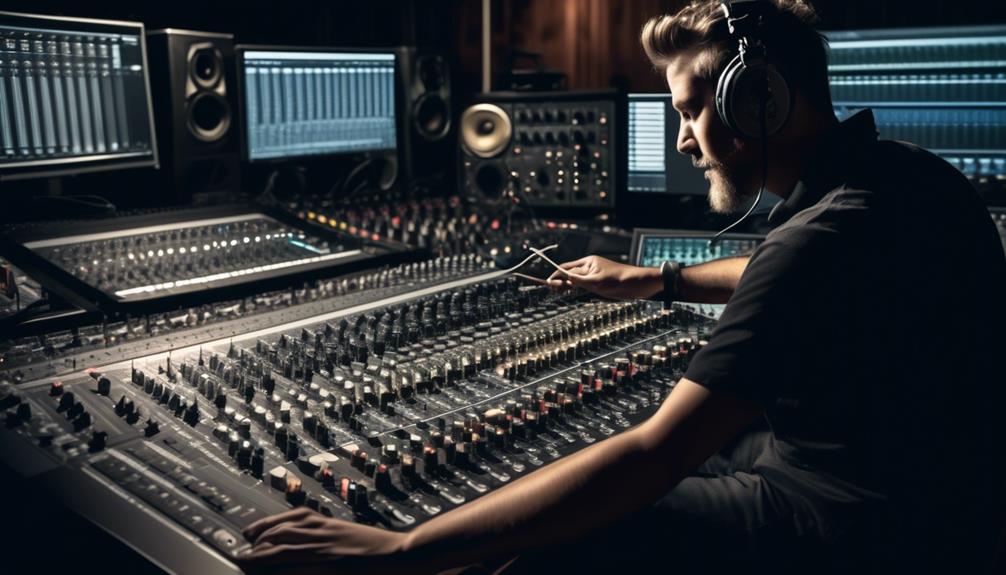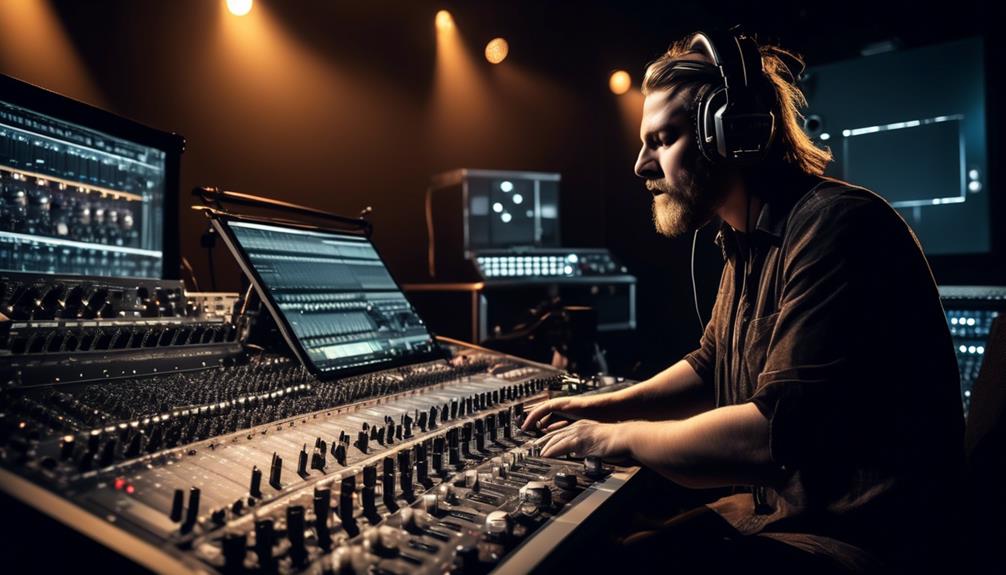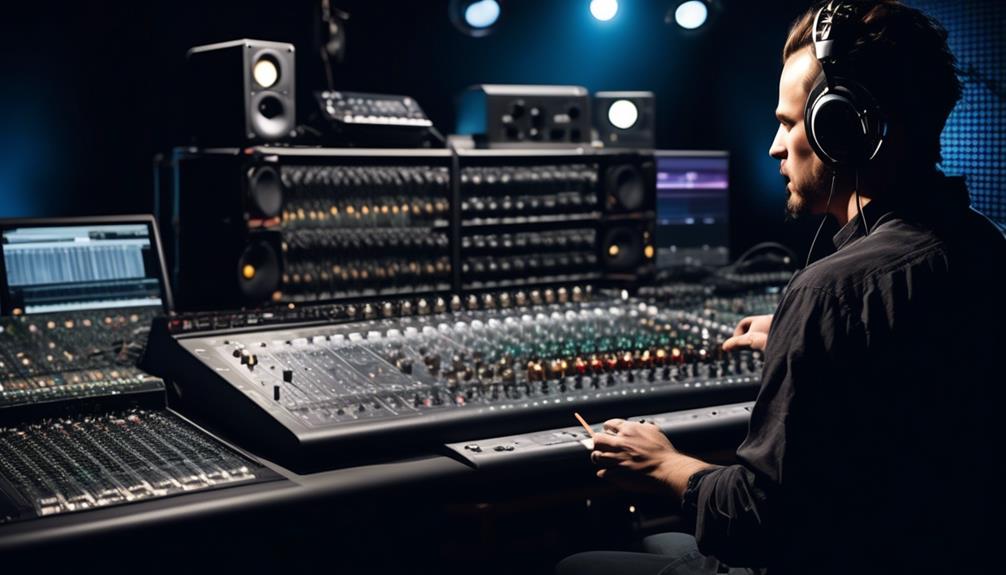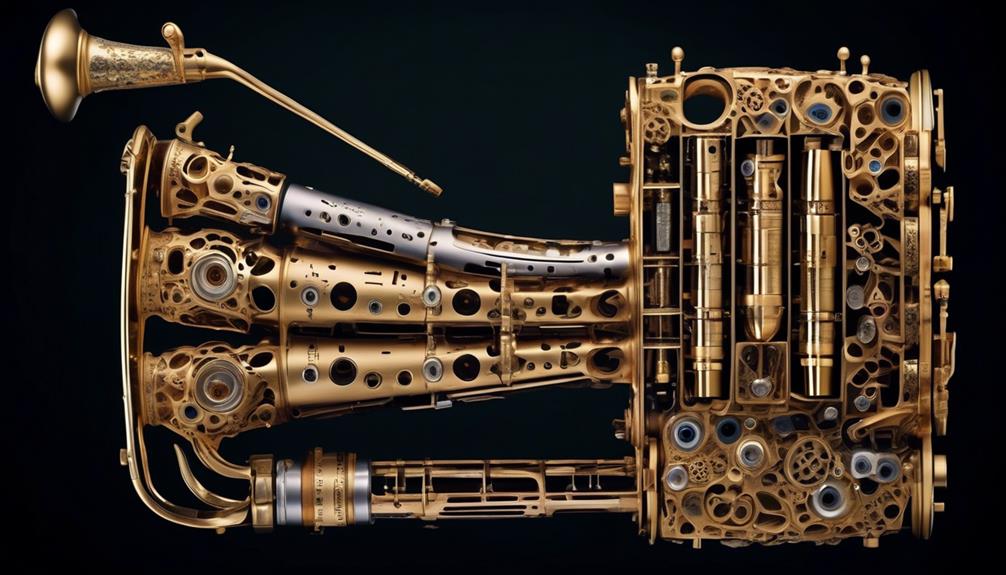You are at a live concert, and that special moment comes when the sound technician works their magic and the music fills the air.
But have you ever wondered about the difference between a sound technician and a recording engineer?
The distinctions between these roles go beyond just their titles, and understanding the nuances can provide insight into the world of audio production.
Let's dive into the technical and creative aspects of each role, uncovering the unique contributions they bring to the realm of sound.
Key Takeaways
- Sound technicians primarily work in live concert settings, managing audio equipment and sound levels, while recording engineers focus on recording studios, ensuring high-quality audio recordings in film, television, and radio production.
- Both sound technicians and recording engineers require technical skills and knowledge in operating and maintaining audio equipment, as well as proficiency in sound processing and editing techniques.
- Sound technicians have better job prospects with a projected 13 percent employment growth rate, while recording engineers have a slightly lower projected employment growth rate of 6 percent.
- Both career paths offer potential for growth and advancement in the field of audio technology and production, and certifications and industry memberships can help impress hiring managers and advance careers.

BOSS Audio Systems BVCP9700A Car Stereo - Apple CarPlay, Android Auto, Double Din, 7 Inch Touchscreen, Bluetooth, No CD DVD Player, AM/FM Radio Receiver
Apple CarPlay - Access icons on your iPhone by activating Siri voice controls the touchscreen. Available features include...
As an affiliate, we earn on qualifying purchases.
Certification Requirements
Certifications play a vital role in the career paths of sound technicians and recording engineers. The Society of Broadcast Engineers (SBE) offers technical training and certification, including the Certified Audio Engineer credential. Additionally, the Association of Music Producers (AMP) provides valuable resources and professional connections. For those seeking networking opportunities and educational workshops, the Audio Engineering Society (AES) is a significant organization. These certifications and industry memberships are impressive to hiring managers and can significantly advance careers in the sound and recording industry.
Obtaining these certifications showcases a commitment to mastering technical skills and staying current with industry standards. For sound technicians and recording engineers, these credentials demonstrate a dedication to excellence in both the technical and creative aspects of audio production. Employers recognize the value of these certifications, as they indicate a level of expertise and experience that can positively impact job duties.
Whether working in live sound, studio recording, or broadcast engineering, these certifications can open doors to fulfilling careers. As sound technicians and recording engineers, pursuing these certifications can lead to increased job opportunities and professional growth within the industry.

BOSS Audio Systems 616UAB Car Stereo With Bluetooth - Single DIN, MP3, USB, Aux-in, AM/FM, No CD DVD Player
DIMENSIONS: 7.94" x 3.94” x 2.28”, Mounting Dimensions: 7.13" x 2.63" x 2"
As an affiliate, we earn on qualifying purchases.
Responsibilities and Duties

After obtaining the necessary certifications, sound technicians and recording engineers are entrusted with specific responsibilities and duties that are integral to the successful execution of their roles in the audio production industry.
Sound engineers play a crucial role in enhancing sounds to achieve the desired artistic results in recordings or live concerts. They're responsible for testing audio equipment before live performances and improving the sound quality of recorded tracks in post-production. Additionally, sound engineers add special effects and manipulate sounds in post-production while also maintaining and setting up sound equipment.
On the other hand, audio technicians perform similar duties as sound engineers, often working under direct supervision to gain hands-on experience. They're responsible for setting up, operating, and maintaining audio equipment in various settings such as recording studios, concert venues, film, television, and radio.
Both sound technicians and recording engineers require technical skills and expertise in audio production to fulfill their duties effectively and contribute to the overall quality of music and sound production.

BOSS Audio Systems 611UAB Car Stereo - Single Din, Bluetooth, No CD DVD Player, AM/FM Radio Receiver, Aux Input, USB
Bluetooth - Answer/make calls and be hands-free with no distractions. The built-in microphone picks up your voice and...
As an affiliate, we earn on qualifying purchases.
Technical Skills and Knowledge
Both sound technicians and recording engineers must possess a deep understanding of audio equipment and systems to excel in their roles within the audio production industry.
Proficiency in operating and maintaining audio equipment, including microphones, mixing consoles, and recording software, is essential for both roles.
Familiarity with sound processing and editing techniques, such as equalization, compression, and signal routing, is crucial for achieving desired sound quality.
Knowledge of acoustics and sound theory is important for implementing sound design and optimizing audio recordings.
Both roles require technical expertise in troubleshooting and resolving issues with audio equipment and systems.
As a sound engineer or audio technician, mastering technical skills and knowledge is fundamental. It involves the operation and maintenance of various equipment, from microphones to complex mixing consoles and recording software.
Additionally, understanding sound processing and editing techniques, like equalization and compression, is crucial for achieving the desired sound quality.
Furthermore, knowledge of acoustics and sound theory is vital for implementing sound design and optimizing audio recordings.
Lastly, possessing technical expertise in troubleshooting and resolving issues with audio equipment and systems is essential for success in this field.

PLZ 10.1" Wireless Single Din Car Radio Stereo with Apple Carplay Android Auto Touch Screen, Car Play Audio Receivers Headunit, Bluetooth 5.3, Backup Camera, 240W, 2 Subwoofers, Navigation, FM/AM, SWC
【Immersive 10.1-Inch IPS Touchscreen】: Compatible with most single/double din dash openings. Enhance your driving with a vivid HD...
As an affiliate, we earn on qualifying purchases.
Work Environments and Settings

Sound technicians and recording engineers operate in diverse settings, such as recording studios, concert venues, film, television, and radio, as well as live event environments like theaters and outdoor venues. In recording studios, both technicians and engineers are responsible for managing audio cables, setting up equipment, and ensuring that the recording environment is optimized for capturing high-quality sound.
In live concert settings, they play a crucial role in setting up audio equipment, managing sound levels during performances, and troubleshooting any technical issues that may arise.
Additionally, sound technicians and recording engineers may find themselves working in film, television, and radio production, where they're responsible for ensuring that audio recordings are of the highest quality. They may also work in theater environments, managing audio equipment for stage productions and live events.
Regardless of the setting, both technicians and engineers need to be adaptable and possess strong technical skills to excel in their job duties, whether it's in music production, live events, or audio recording for various media platforms.
Salary and Career Outlook
In the field of audio technology and production, the salary and career outlook for sound technicians and recording engineers is influenced by various factors such as skill set, qualifications, and job responsibilities. When considering the salary and career outlook for sound technicians and recording engineers, it's important to note the following:
- Sound Engineers receive an average salary of approximately $44,001 per year, while Audio Technicians earn an average of $40,706 annually, reflecting differences in experience and responsibilities.
- Audio Technicians generally have somewhat better job prospects, with a projected 13 percent employment growth rate from 2016 through 2026, according to the Bureau of Labor Statistics.
- Sound Engineers have a projected 6 percent employment growth rate during the same period, indicating slightly slower growth compared to Audio Technicians.
- Both career paths offer potential for growth and advancement in the field of audio technology and production, particularly for those who develop a strong combination of technical skills and creative abilities.
- Entry-level positions in studio settings, working alongside music producers and other professionals, provide valuable opportunities for aspiring sound technicians and recording engineers to gain practical experience and advance their careers.
Frequently Asked Questions
Is a Sound Engineer the Same as a Sound Technician?
Yes, a sound engineer and a sound technician have some overlapping qualifications and duties.
Sound technicians often handle equipment and assist sound engineers, while sound engineers focus on advanced skills like sound manipulation and artistic outcomes.
Both roles require technical education, but sound engineers may need more advanced training.
Sound technicians gain experience in various audio environments, while sound engineers command higher salaries due to their specialized skills and experience.
What Does a Sound Recording Engineer Do?
In the realm of sound recording engineering, our work involves mastering mixing techniques, operating studio equipment, and managing live sound. We handle signal processing, optimize acoustic environments, and navigate both digital recording and analog technology.
Additionally, we excel at sound editing, music production, and sound design. Our expertise ensures the artistic vision is realized, and we work closely with artists and producers to achieve the desired sound quality and effects.
What Is the Difference Between Sound Engineering and Audio Engineering?
In the realm of sound engineering, the distinction between sound engineering and audio production lies in the application. Sound engineering focuses on live mixing and acoustics theory, while audio production delves into studio recording, digital editing, and analog processing.
Both require expertise in equipment operation, signal processing, and music production. Understanding these differences is crucial for mastering the technical and creative aspects of each discipline.
What Are the 3 Responsibilities That Sound Recording Engineer Has?
As sound recording engineers, we have three main responsibilities.
First, we ensure optimal performance of studio equipment for sound mixing and music production.
Second, we excel in live events, utilizing acoustic design and microphone techniques.
Conclusion
In conclusion, the distinction between a sound technician and a recording engineer lies in their specific roles and responsibilities within the audio industry.
While both require technical expertise, a recording engineer encompasses a broader scope of sound design and production, working closely with artists and producers.
On the other hand, a sound technician primarily focuses on operating and troubleshooting audio equipment.
Both roles offer unique opportunities for those with a passion for audio technology and production.










